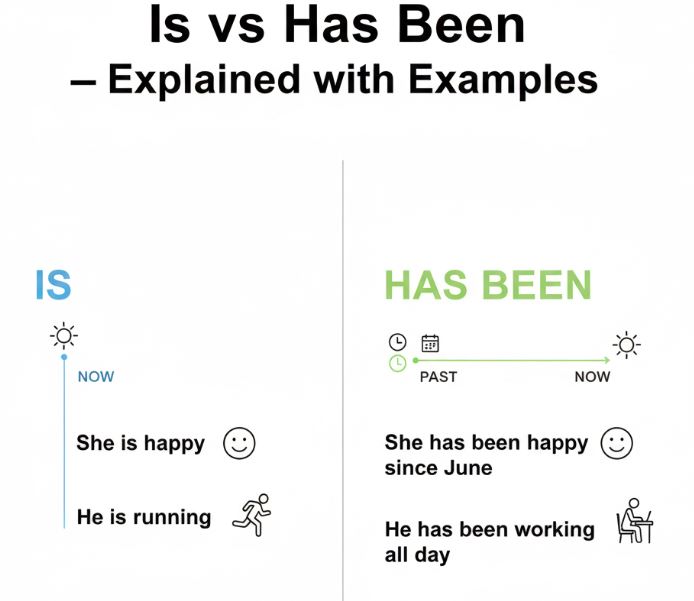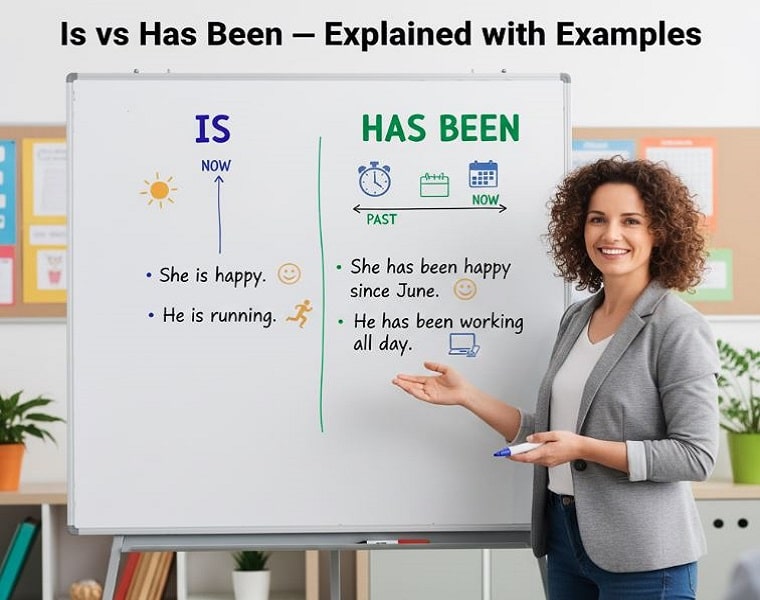If you’ve ever felt confused about when to use is and when to use has been, you’re not alone. These two forms of the verb to be are common in English, but they serve different purposes.
The quick answer:
Is describes a state or action happening right now.
Has been describes something that started in the past and is still true now, or an action completed in the past but with results in the present.
This guide will break down the meaning, English grammar, differences, and examples of is vs has been. You’ll also see comparison charts, practice exercises, and FAQs to make everything simple.
Quick Answer: Is vs Has been
Is = Present tense of to be. Used for current states or actions happening at the moment.
Example: She is happy.Has been = Present perfect form of to be. Used for states or actions that started in the past and continue to the present, or for present perfect passive.
Example: She has been happy since June.
Think of is as “right now” and has been as “from the past until now.”
What Each Form Means
Is
Simple present tense of to be.
Describes facts, states, or ongoing actions in the present.
Examples:
The sky is blue.
He is tired.
She is running.
Has been
Present perfect form of to be (has + been).
Used to show a connection between the past and present.
Functions in three main ways:
State since the past → She has been a teacher for 10 years.
Present perfect continuous → He has been working since morning.
Present perfect passive → The house has been cleaned.

Key Differences Between Is and Has been
| Feature | Is | Has been |
|---|---|---|
| Tense | Present Simple | Present Perfect |
| Time reference | Now / at the moment | Past → Present (still true now) |
| Function | State, description, present action | State/action started in past, continues now, or present perfect passive |
| Example | He is at home. | He has been at home all day. |
Tip: If it only describes the present moment, use is. If it links past and present, use has been.
Examples of Usage
Is examples
The coffee is hot.
She is my sister.
He is driving to work right now.
Has been examples
She has been my friend since childhood.
The project has been delayed twice.
He has been studying all afternoon.
How to Choose Correctly
Ask yourself:
Is this only about right now? → Use is.
He is sick. (current condition)
Did it begin in the past and continue now, or does it affect the present? → Use has been.
He has been sick since yesterday. (past → now)
Common Mistakes and Fixes
❌ He is working here for 5 years.
✅ He has been working here for 5 years.
❌ The room is cleaned yesterday.
✅ The room has been cleaned.
Remember: Has been often works with “for” and “since” to show duration.
Comparison Chart: Is vs Has been
| Situation | Correct Form | Example |
|---|---|---|
| Current state | Is | She is tired. |
| Present continuous action | Is + -ing | He is reading. |
| State continuing from past | Has been | She has been tired all week. |
| Action continuing from past | Has been + -ing | He has been reading for 2 hours. |
| Passive (present perfect) | Has been + past participle | The letter has been sent. |
Exercises: Practice Time
Fill in the blanks with is or has been.
She ___ my best friend.
The room ___ cleaned already.
He ___ working here since 2015.
This book ___ very interesting.
The weather ___ bad all week.
Answers:
is
has been
has been
is
has been
Real-World Usage
In conversation, people often shorten forms:
She’s happy. (= She is happy)
She’s been waiting. (= She has been waiting)
In formal writing, contractions are usually avoided.
Summary Cheat-Sheet
Is = now.
Has been = past → now.
Is = She is tired.
Has been = She has been tired since yesterday.
Read also more related quizzes: Has Been vs Was
FAQs
Is vs Has been examples — what’s the difference?
She is busy now. (present state)
She has been busy all morning. (started earlier, continues now)
Is vs Has been grammar — which is correct?
Use is for the simple present.
Use has been for present perfect (state, continuous, or passive).
3. Is vs Has been meaning?
Is = describes the current moment.
Has been = describes something from the past that is still true or relevant.
4. Is vs Has been Differences?
Is is simple present.
Has been is present perfect.
One shows “now,” the other shows “past + now.”
5. Is vs Has been Comparison Chart?
See the chart above — quick side-by-side for usage.

